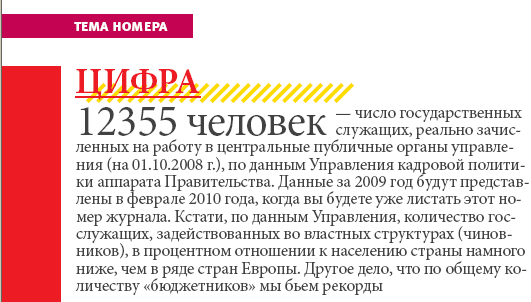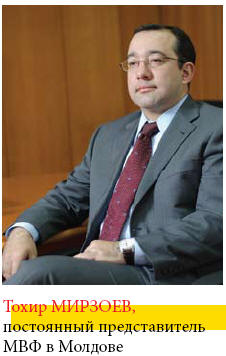Soon our officials will have to be mentioned in the "Red
Book". "Crisis", "expenditure optimization", "budget cuts",
"staff reductions" have become the most popular phrases
heard in the corridors of Moldova's power structures and a
bad dream for thousands of public servants. The Motherland
will start making savings on their account!
However, how
much are the officials getting paid for, what is so
attractive in the state service, how much they cost to the
state, and how the state is going to "get rid of them"?

IMF Resident Representative in Moldova
Tokhir Mirzoev
said in an interview to Business Class journalist:
"When compared to employment trends in other
ECA countries, public sector employment in
Moldova is substantially higher than in most
of Eastern Europe, although it is generally
in line with CIS countries. One feature of
the public sector in Moldova is that it
employs a large number of staff with
relatively low compensation (e.g. the
education sector employs about 4 percent of
the population, but its average wage is
about a half of the average wage in the
private sector). With budget resources
limited, a key choice facing the government
is to either keep the current number of
staff with uncompetitive wages or to advance
civil service reforms allowing to reduce the
number of staff and increase the wage level.

But a more important question is whether
Moldova’s public sector is efficient in
providing public goods and services that
are i) affordable given the country’s
available resources; and ii) adequate,
reflecting the country’s priority needs.
Given the economic downturn, Moldova is
struggling with the outcome of excessive
public spending growth during the past
several years. The downturn has quickly
drained the government’s financial
resources, because in “good times”, the
public sector has not saved enough for a
“rainy day”. To ensure sustainability of
public finances, growth of public
spending would need to be contained
going forward.
The composition of Moldova’s public
spending also warrants policy changes.
In particular, public sector wage hikes
of the recent past have been well in
excess of the economy’s productivity
gains. For example, last year real wages
in the Moldova’s government sector
increased by 20 percent compared to only
5 percent increase afforded in the
non-government sector. As a result, in
2009, the country’s public sector wage
bill is estimated to have consumed over
a quarter of the total government
expenditure and over 12 percent of the
country’s GDP—among the highest in the
region.
But to achieve Moldova’s goals of
promoting economic growth and poverty
reduction, public expenditure needs to
be oriented toward more social and
investment spending, and less
consumption. It would also be important
to implement efficiency-enhancing
reforms in education and health care,
and set adequate tariffs in the energy
and heating sectors to cover costs of
production while improving targeting of
social assistance to mitigate the impact
on the most vulnerable households."